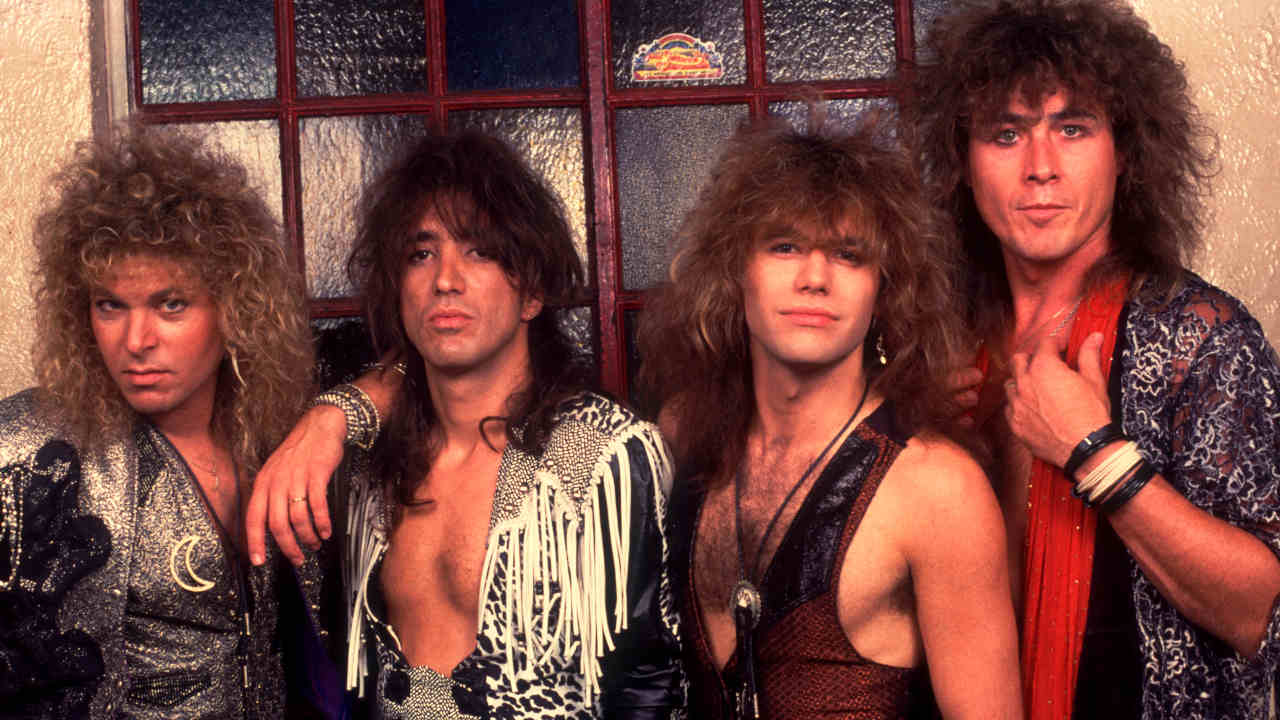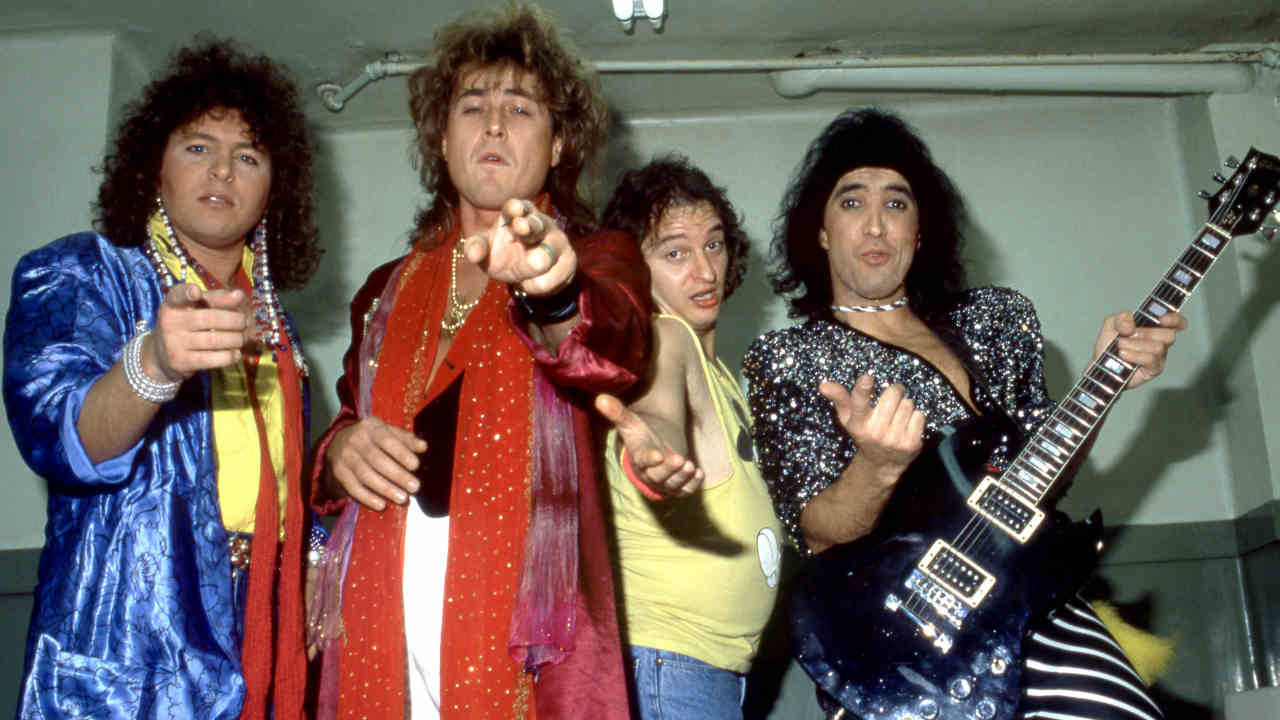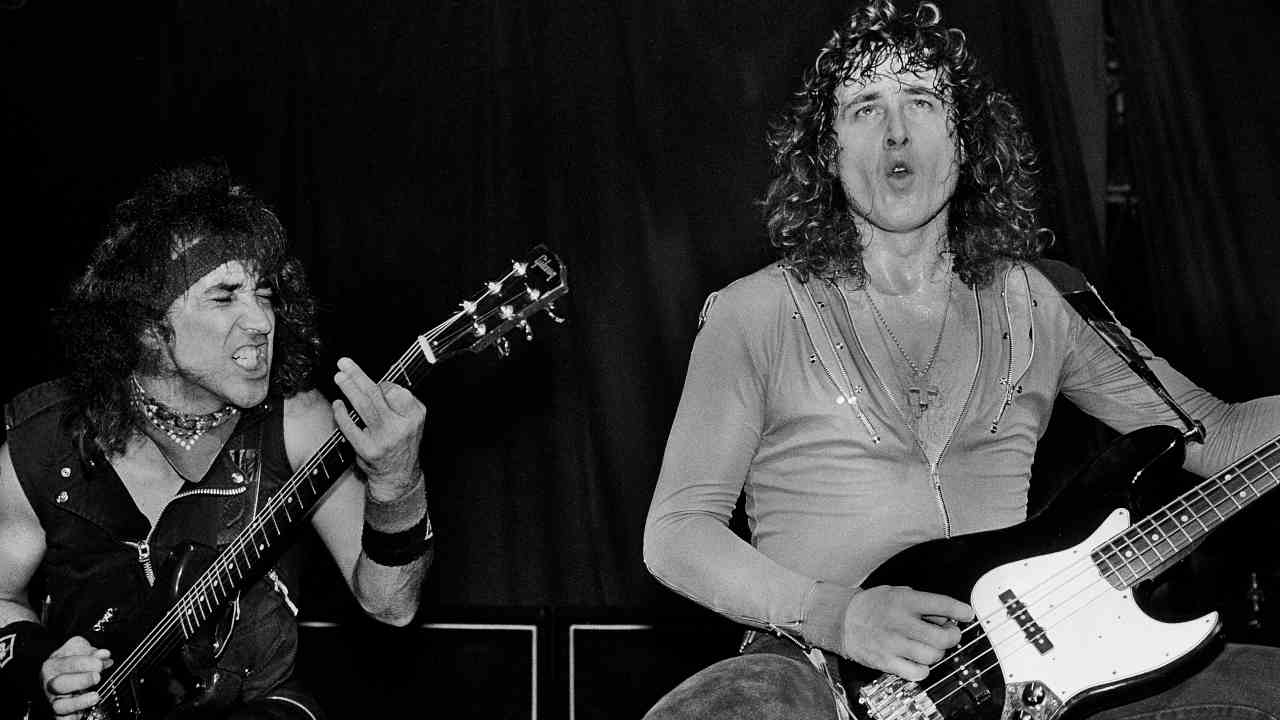
San Francisco’s Y&T were one of the greatest hard rock bands of the late 70s and 80s thanks to albums such as Earthshaker and Black Tiger and songs like Rescue Me and Summertime Girls, but their reputation as a hard rock powerhouse was never matched by their sales. In 2005, frontman Dave Meniketti sat down with Classic Rock to look back over the career of one of rock’s greatest but unluckiest bands.
Let’s be honest: most reunions suck. All too often thrown together through desperation, minus key personnel, regroupings usually fail to recapture the spirit and quality of the original incarnations. When San Francisco hard rockers Y&T, on the other hand, toured the UK in the summer of 2005 – the first time in 22 years they’d played these shores – their powerhouse live shows easily matching the performances of yesteryear.
The quartet must still seal the deal by returning to the studio, and rhythm guitarist Joey Alves is sadly absent from their ranks, but guitarist Dave Meniketti’s lungpower has diminished virtually nil, bassist Phil Kennemore must have been cryogenically frozen back in the late 80s and, despite slimming down drastically, Leonard Haze slams the skins with all the same fervour and finesse. Besides their skills as musicians, Y&T also have the luxury of an expansive repertoire.
“Most nights we don’t bother with what you’d call a real set list,” says Dave Meniketti, a couple of hours before a Mean Fiddler show that will surely bring back good memories for both band and audience. “We go out and play maybe half an hour of planned material, then throw the rest of the show open to requests – and we’re on stage for two hours. It’s up to the fans let us know what they want to hear.”
Formed in California’s Bay Area at the turn of the 70s, Yesterday & Today (as they were originally known) joined ZZ Top on the roster of London Records, releasing two albums for the label: 1976’s self-titled debut and Struck Down in 1978.
Newly abbreviated to Y&T (“It’s what the fans called us anyway,” Meniketti explains), they already had a following in Los Angeles where, among numerous appearances at the Starwood Club, Van Halen and Mötley Crüe opened for them, the latter making their own debut. It was the start of a longstanding friendship.
“Lots of bands that became big checked us out at the Starwood, wanting to get backstage afterwards,” Meniketti reminisces. “Bobby Blotzer [Ratt drummer] was a big fan, so was Blackie Lawless [of WASP]. Years later, we’d be out on the road and bands would tell us, ‘Oh man, we cut our teeth watching you guys at the Starwood.’ We heard that so many times I lost count.”
Y&T’s fortunes were kick-started by the aptly titled Earthshaker. A punchy, irresistible slice of commercial hard rock from start to finish, the 1981 album’s twin defining moments were Rescue Me and I Believe In You. Both introduced by melancholy acoustic passages, the former was a swaggering, chest-beating anthem, the latter lasted for seven mesmerising minutes, Meniketti’s vocals and squealing guitar building towards a climax worthy of Joan Collins in The Stud.
“We had no idea that Earthshaker would make such an impact, especially in Europe,” claims Meniketti. “It wasn’t until we came here to Britain to record [follow-up] Black Tiger that we discovered people even knew who we were.”

Indeed, incredible scenes greeted Y&T at a pair of now fabled June 1982 shows at the old Marquee Club in London’s Wardour Street; it has even been claimed that the venue’s sweltering conditions caused the rubber on a guitar stand to melt.
“Completely true!” swears Meniketti. “I even had heatstroke afterwards. They were almost crowbarring people into the place. Not only did it shock us, it made our booking agent [Rod MacSween] sit up and take notice.”
The second album as Y&T, 1982’s aforementioned Black Tiger, was recorded in Surrey with Max Norman and turned out to be as auspicious as Earthshaker.
“Being out in Surrey, amid rolling hills, sheep and 16th-century buildings, was amazing – it really rubbed off on the record’s vibe,” reflects Meniketti. “And having played those first amazing European shows… Jesus, you can also hear the shock factor of that.”
Mean Streak (’83) was inferior to its two predecessors (“We kinda stretched out a little with the songs, maybe alienating some of the real hard rock fans,” admits Dave). But Y&T had made an impression at the previous year’s Reading festival, and snapped up an offer to support AC/DC, who were promoting For Those About To Rock….
“The AC/DC guys saw us at Reading and remembered us supporting them at a few Texan dates while Bon Scott was alive,” the guitarist relates. “They had great respect for us; in fact, Bon chose to hang out with us more than them. He thought they were boring for not letting chicks onto the bus. We were still young, smoking dope and hanging out with groupies, so he came along with us.”
It was while Y&T were on the road with AC/DC that Meniketti received an unusual offer from Ozzy Osbourne.
“In Dublin he came backstage with Sharon,” relates Dave, still clearly amused. “And in front of my entire band, Ozzy got down his knees and said, ‘David, would you please join my band.’ I looked around and thought, ‘Oh no, this isn’t gonna go down well with the rest of the guys.’ I replied: ‘Thanks, but I’m kinda busy,’ to which Ozzy insisted that I teach his guitarist, Brad Gillis, how to be a rock star.”
Y&T themselves needed no tuition when it came to the art of hellraising. Indeed, Meniketti insists that Mötley Crüe’s tour manager once had to lay down the dressing room law, claiming his charges were being lead astray by their then support band.
“The Crüe were supposed to be the ultimate party animals,” he chuckles. “And two weeks into the tour we were being told, ‘Can you keep your guys away from our guys? Leonard and Phil are a bad influence.’ There was a lot of oneupmanship going on backstage; mass orgies and stuff. Nikki Sixx once put his cigarette out on Phil’s arm. Phil saw that as a challenge; we put decaying fish onto their microphones.”
Y&T went along with record label A&M’s suggestion of collaborating with songwriter Geoff Leib on their next album, 1984’s In Rock We Trust. “We thought we’d made a really deep record, but the UK the press slammed us,” he winces.
Flying in for interviews two days before that year’s Castle Donington festival, it was a thoroughly deflated Y&T that appeared mid-way up a stellar bill of headliners AC/DC, Van Halen, Ozzy Osbourne, Gary Moore, Accept and Mötley Crüe.
“We were praying the fans wouldn’t hate us, too,” admits Dave. “But after two days off being nailed by the press, and never having had anything thrown at us at a UK festival until then, we took those few bottles of piss that did hit us to heart.”
Y&T wouldn’t play again in Britain for almost two decades. The following year’s live album Open Fire included the studio cut Summertime Girls, its highly comical video featuring the rotund Haze preening amid bikini-clad beauties. Because Summertime Girls had been America’s tenth-most-requested song for a fortnight in ’85, A&M hooked them up with REO Speedwagon producer Kevin Beamish for that year’s Down For The Count. Red-hot in the wake of tours with Aerosmith and the Crüe, Beamish had wanted them to call the record Poised For Platinum, but band and label had reached the end of the road. Given the high-profile tours they’d been on, Meniketti doesn’t lay all the blame for what went wrong on A&M.
“In Europe and Japan they were great,” he says. “But in America it was a different story. They were constantly on our butts for us to try particular songs or ideas, even with record covers. Any other company that dealt in quality hard rock, such as Atlantic, would have broken us at least two albums earlier.”
Released from their contract whilst out on tour, Y&T met with Geffen executive John Kalodner, who snapped them up for Contagious and Ten; the former saw Jimmy DeGrasso succeed Haze, Stef Burns taking Alves’ place for the latter in 1990. “It was the 90s; there were drug issues, personal problems – you name it,” says Meniketti. “For some of us, motivation was getting lost along the way.” Worse still, the new record deal wasn’t turning out to be all it seemed.
“Kalodner told us, ‘A&M is the worst label in the world; my niece could’ve broken Summertime Girls’,” smiles Meniketti. But hardcore fans regarded the sugarcoated, Desmond Child-esque strains of Contagious’ title track with weary suspicion and Geffen were unable to triumph where A&M had already failed. “Contagious came out in the exact same week as two records you may have heard of: Appetite For Destruction and 1987 [by Whitesnake],” sighs Dave wearily.
The band had already decided to split if Geffen failed to back Ten, and two weeks of touring was all it took to make up their minds. “Our longevity was working against us,” explains Dave. “Grunge was coming in, the writing was on the wall.”

Y&T’s 17-year run ended on New Year’s Eve 1990, with a show at The Cabaret in San Jose, later documented as the Metal Blade Records double set Yesterday & Today Live. However, the group remained friends and returned to the same venue to usher in both ’92 and ’93 with reunion events. Two years later, a new CD called Musically Incorrect was put on sale for the Japanese market, followed by Endangered Species in 1997. With numerous best-of anthologies having kept their name alive, a well-received appearance at 2003’s Sweden Rock Festival encouraged Y&T to permanently reunite, John Nymann replacing the still-absent Joey Alves.
That same year, the new-look group joined Whitesnake and Gary Moore on a Monsters Of Rock arena tour of the UK. Having exhumed two solid CDs of archive material in twin volumes of Unearthed, the quartet’s next task is a new studio album.
“We’re back for good and we kick butt every night, maybe more so now than ever before,” states Dave proudly. “But if you’d asked me about a new record six months ago I’d have been doubtful. Does the demand even exist? The musicians in Whitesnake told me they’re desperate to release something new because they want to prove they’re good, but David [Coverdale] was like, ‘Why? Let’s just do DVDs.’ I don’t really understand that attitude. Even if no one cares except the band and a few fans, I still believe it’s something we should try our best to do.”
Originally published in Classic Rock 85. Since this piece was published, Leonard Haze, Phil Kennemore and Joey Alves have all passed away







